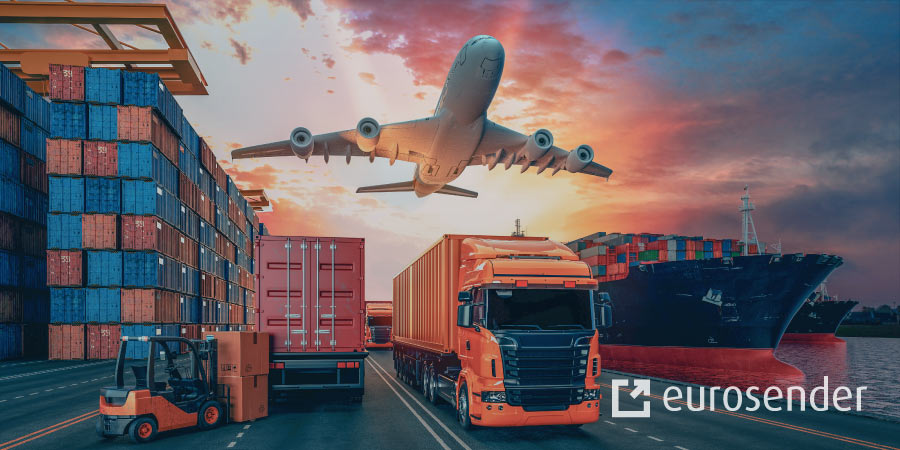What Is International Shipping?
TL;DR
- International shipping moves goods across countries via air, sea, rail, or road.
- It supports global trade, allowing businesses and consumers access to worldwide products.
- Key steps include preparing goods, transportation, customs clearance, and final delivery.
- Costs and delivery times vary based on the shipping method, customs, and other factors.
Create an account for free!
A beginner’s guide to international shipping
Have you ever wondered how the products you order from halfway across the world arrive at your doorstep? Or how businesses manage to source materials from the other side of the globe? This journey from one corner of the earth to another is made possible by the marvel of international shipping.
Far from just a logistical operation, international shipping is a bridge that connects cultures, economies, businesses and individuals, making the global marketplace a reality for us all. This guide breaks down what international shipping is, its critical role in our daily lives and global economy and highlights how Eurosender is at the forefront of simplifying these international connections.

What does international shipping mean?
International shipping refers to the process of transporting goods from one country or continent to another through various modes of transport, including air, sea, rail, or road. This process involves a series of steps, including customs clearance, international trade compliance, and logistics management, ensuring that goods move seamlessly across borders.
Importance of international shipping
The global economy relies heavily on international shipping. It enables businesses to expand beyond local markets, accessing a global customer base and a diverse range of products and resources. Furthermore, it allows businesses to access to raw materials and finished goods not available locally, and supports the global supply chain.
For consumers, it means the luxury of purchasing goods from anywhere in the world. In essence, international shipping fosters global trade, supports economic growth, and promotes cultural exchange.
Without international shipping, the exchange of goods on a global scale would be significantly hindered, affecting economies and consumers worldwide.
You may also be interested in:
How does international shipping work?
Now that we have covered what international shipping is and how it is crucial for our everyday lives, let’s dive into how international shipping works in theory. International shipping involves several key steps, such as:
- Preparation of goods: The process begins with preparing the goods for shipment, including packing and labeling. Ensuring products are properly packaged, labelled for shipping, and ready for transport is a crucial step when it comes to international shipping.
- Pick-up and handling: Goods are then collected by the courier and taken to a warehouse or directly to a port or airport, depending on the mode of transport.
- Shipping documentation: Completing necessary customs and shipping documents, including commercial or proforma invoices, packing lists, and any other required documents for export or import.
- Transportation: Moving the goods using one or more modes of transport (air, sea, rail, or road), from the initial pickup to the final delivery point.
- Customs clearance: Goods must be cleared through customs when shipping outside the EU. The customs clearance process usually involves inspection of the shipment, required documents for export/import and tariff payments.
- Transport: The goods are then transported using one or more modes of transport. The choice of transport depends on several factors, including cost, distance, and the nature of the goods.
- Delivery: Upon arrival at the destination country, goods undergo customs clearance before being delivered to the final recipient.
Delivery times for international shipments
Delivery times can vary widely based on the destination, mode of transport, selected shipping service and customs processes. They can also be affected by other factors such as traffic and weather conditions. Air freight is typically the fastest method, with shipments taking anywhere from a few days to a week. Followed by road freight, which can be a more affordable shipping solution. Sea freight, while more cost-effective for large shipments, can take several weeks or even months.
Check the transit time for some of our shipping services:
The cost of international shipping
Costs are influenced by the weight and dimensions of the shipment, selected shipping service (express delivery costs more than standard shipping), the mode of transport, the route, and additional features like insurance and tracking. Fuel surcharges and customs duties also affect the overall cost.
Getting a quote from Eurosender can provide a clearer picture of potential expenses and shipping costs.
Challenges of international shipping
Navigating the complexities of international shipping includes dealing with customs procedures and regulations, which are different from country to country, managing logistics across different transport modes, and handling the risks of damage or loss. Additionally, fluctuating fuel prices and international trade policies can impact costs and delivery times.
How safe is international shipping?
The good news is international shipping is very safe these days. It follows strict rules to make sure goods are handled properly and arrive safely. With the latest tracking technology, you can watch your package’s journey from start to finish, which helps avoid losing or misplacing it.
Also, you can choose insurance for extra peace of mind, covering any damage or loss. The correct way of packing your goods, alongside the use of quality packing materials, adds another layer of safety to your international shipment. When you ship with well-known companies, as those Eurosender works with, you’re even more assured your items are in good hands.
Read more about the safest ways to ship parcels internationally.
You may also be interested in:
International shipping with Eurosender
Eurosender simplifies international shipping, offering an easy-to-use platform that connects you with leading logistics providers. Whether you’re shipping small parcels or large freight, Eurosender provides tailored solutions that meet your needs, backed by expert support to navigate the complexities of international logistics.
International shipping is an integral component of global trade, facilitating the movement of goods across borders. Understanding its workings, challenges, and solutions can help businesses and individuals navigate this complex landscape more effectively. With Eurosender by your side, embracing the possibilities of international shipping becomes simpler and more accessible.
Still have questions?
Check our delivery guides for more information.
Create an account for free!
About the author






